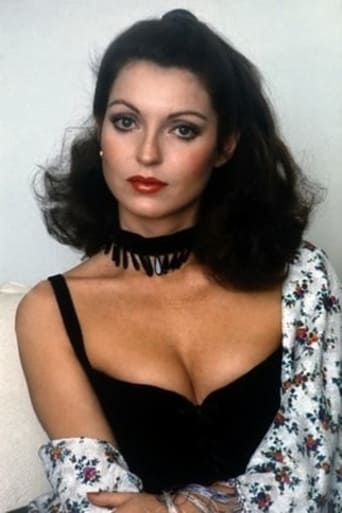Dotsthavesp
I wanted to but couldn't!
Gutsycurene
Fanciful, disturbing, and wildly original, it announces the arrival of a fresh, bold voice in American cinema.
InformationRap
This is one of the few movies I've ever seen where the whole audience broke into spontaneous, loud applause a third of the way in.
Mandeep Tyson
The acting in this movie is really good.
nandoflorestan
As a pianist and lover of Chopin's music, I really wanted to like this. But it's just an annoying artsy-fartsy mess in which multiple talents are wasted due to the poorest direction.Director, you are a moron. Hysteria + hysteria + hysteria = boring. When all your "characters" are flamboyant, no one really is. All the portraits in this mess are failures because they have no individuality, they are all the same manic person -- who is this, you? You give it no rest for 2 hours... Such a pain to watch. You have absolutely no sense of contrast or rhythm. And by the way, Chopin's music does not work as background for constant hysteria. You are unworthy of making a movie about any of these people.Viewers today will be expecting a little slice of Chopin's biography, but instead of doing this respectfully and getting out of the way, the director wants to steal the scene for himself. This is just a bunch of stuff that George Sand wrote, juxtaposed with no sense, care or taste. The direction given to the actors seems to have been, "Imagine a sane person saying this in a normal way, then do the opposite -- imagine you are Nicolas Cage". The result is incomprehensible and fails to portrait any of the famous personalities we could be interested in.On a side note, viewers today also will be ignorant of the significance of these personalities. I am ashamed to confess I didn't know anything about Alexandre Dumas' son. No help is given -- the director is openly hostile to the masses.
FilmCriticLalitRao
'La Note Bleue' is a sublime film about the last days of acclaimed Polish composer Frédéric Chopin's life. It was a time when most artists belonging to who's who of European intellectual tradition rubbed shoulders with each other in order to have a nice time. Apart from George Sand, one can see him surrounded by writers as varied as Ivan Turgenev and Alexandre Dumas Fils. Director Andrzej Zulawski has directed a film which is bound to please music lovers as much as lovers of cinema. He has cared a lot for authenticity by choosing to cast the real classical pianist Janusz Olejniczak as Chopin. In many ways, he has been able to select the ideal subject for his film as like Chopin, it can be surmised that he too must have had experienced the same sensations of being a talented Pole in an alien land (France).What is really striking is about this film is the manner in which actors get into the depth of their roles. Whether it is late French actress Marie France Pisier as George Sand or Zulawski's former wife actress Sophie Marceau as Solange Sand, emotional depth of acting performances is absolutely palpable. There is a lot of listen and see in this film as mellifluous classical music runs throughout and there are plenty of dramatic scenes too. This is one of the few practical reasons for audiences interested in cinema as well as music to watch 'La Note Bleue'- an honest film made by Andrzej Zulawski who once stated that to please the majority is the requirement of the planet cinema. He went on to add that as far as he is concerned, he doesn't make a concession to viewers, these victims of life, who think that a film is made only for their enjoyment, and who know nothing about their own existence.
przeszkoda
After seeing this movie, I just sat breathless in my armchair - I just hadn't seen such a movie before. Truly, a masterpiece on par with Peter Greenaway's finest. Beatufilly filmed, superbly acted (Olejniczak, a pianist by trade - a damn good one at that: he recorded the soundtrack to Polanski's "The Pianist" - is very true to the role of Chopin in his final moments), classy scenography... The action is presented in a way resembling the very atmosphere of the romantic period's art - hectic and rich in expression. The movie's goal is to portray emotions, not a plot - and this goal it achieves perfectly. But, as with romantic art, this movie requires a certain mindset - an openness to emotion - or it will be totally misunderstood.When I finally regained my senses, I've instantly decided to jump on IMDb.com to see how other people could've perceived this one-of-a-kind film - and guess what? A general rating of 3.7. Some people do not understand cinema as an art form at all. Just because the movie isn't something most people are used to nowadays doesn't make it a bad one.I am going to risk the claim that if you won't like this movie, you won't like art of the romantic period at all. Really, "La Note Bleue" embodies the whole spirit of the romantic period.
david melville
Exquisitely portraying the last days of 19th century Europe's most infamous 'celebrity romance,' the Franco-Polish director Andrzej Zulawski has made a film that defines an era. Just as the Middle Ages (for us cinephiles) will always be Bergman's The Seventh Seal, or the Belle Epoque will always be Visconti's Death in Venice, so the Romantic Age will always be (for the lucky few who've had a chance to see it) Zulawski's La Note Bleue.The fact that the Bergman and Visconti films are world-famous, while Zulawski's has barely been heard of outside his small circle of diehard fans, should be enough to convince you (if you're not convinced already) that distribution of world cinema really has hit rock-bottom in the Age of Miramax. Trust me, La Note Bleue is an unqualified masterpiece! Having seen it once, I would happily sell my soul for a chance to see it again.The story itself is a familiar one. The exiled Polish composer Chopin (played by Janusz Olejniak, a real-life Polish pianist with no prior acting experience) is living with his mistress, the romantic novelist George Sand (Marie-France Pisier) in her idyllic country retreat at Nohant. After years of tempestuous on-and-off passion, Chopin still loves his lady, but his eye is turning more and more towards her provocative and nubile daughter (Sophie Marceau).How is their 'conflict' resolved? Well, it isn't, really - for the simple reason that nothing in life ever truly is. The turbulent trio entertain a houseful of illustrious guests. Among them are the writer Alexandre Dumas, fils (mourning the death of his real-life Lady of the Camellias) and the opera diva Pauline Viardot (trilling some sublime Bellini arias on the soundtrack). Sand's handsome but sinister son models puppet look-alikes of all the guests. Acrobats from a travelling circus float among the trees, like diaphanous orange phantoms.Each one of the performances is flawless. As George Sand, Marie-France Pisier is every inch the seductive but maddening 'monstre sacre' of so much literary myth. Sophie Marceau is irresistible as her daughter - half-Lolita, half-Lady Macbeth - the first stage of her evolution from Gallic teenage sexpot to mature actress. As for Olejniak, I can only believe he was an acting neophyte because Zulawski said so himself. In every word and gesture, every sublimely beautiful image of this film, you see the Romantic Era come to life. You sit in awe, nod your head dumbly, and think "Yes, it was really like this!" If it wasn't, History got it wrong.




